The continued resilience of the RIPE community during the COVID-19 pandemic has helped the Internet keep running. This hasn't been easy, but we're in it together! Vesna Manojlovic draws a parallel between universal human needs and OSI model networking abstraction layers.
It’s been a year of March.
For the first anniversary of the COVID-19 pandemic (*), let’s take a look at resilience.
“Prevalent human nature in disaster is resilient, resourceful, generous, empathic and brave” — from Rebecca Solnit's “A Paradise Built in Hell”, as mentioned in the Guardian, March 2020
“The coronavirus measures are testing everyone’s resilience, both physically and mentally. The longer the crisis continues, the more difficult it becomes for everyone. Now that a year has passed, the pandemic’s social and economic effects are mounting dramatically. “ — Dutch government, March 2021
Within the RIPE community, we have been measuring the “health of the Internet” on the operational level in terms of latency, stability, outages, shutdowns, and other technical performance indicators.
However, as Uta Meier-Hahn pointed out back in 2017, social connections between people are also essential for the running of Internet infrastructure. A straightforward example would be peering agreements, which are so often based on personal relationships within the “community of networkers”. These human connections on which the Internet relies themselves rely on things that go beyond the technical, i.e. notions of trust, emotion, safety, belonging.
As a Community Builder and Trusted Contact for the RIPE community, I want to focus on the health of the community, and on taking care of the networkers, their physical, mental and spiritual health. But how to talk to techies about feelings and needs?
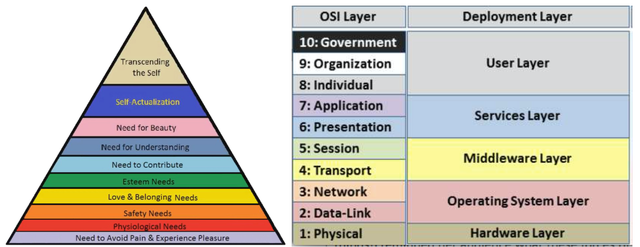
OSI and Universal Needs
While struggling to find an appropriate tone and analogy, and to organise many topics about what pandemic resilience means to the RIPE community, it occurred to me that one useful approach might be to to map the classification of universal needs, illustrated by popular Maslow’s pyramid (above left), to the OSI Layers model (Open Systems Interconnection - above right) familiar to all networkers.
Both models have been extended over time. To the classical seven OSI layers, the “Financial” and “Political” layers have been added by Evi Nemeth (as was made famous on the T-shirt still available at ISC web shop!). Maslow’s pyramid has also been modified and critiqued by academics.
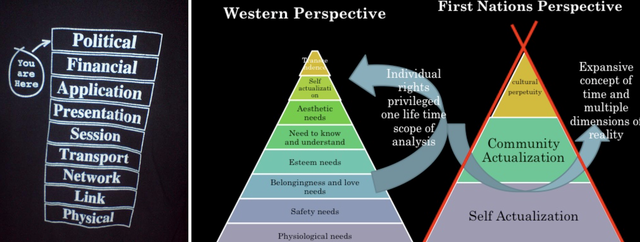
To explore the usefulness of this analogy, I'll be following up on this article by looking at how the various layers and the corresponding “motivations” or needs line up with each other, and look at how paying attention to each level of these models can help us all get through times like these. Look out for more on RIPE Labs!
- Layer 1: Physical / Physiological needs
- Layer 2: Data Link / Safety needs
- Layer 3: Network / Belonging needs
- Layer 4: Transport / Esteem needs
- Layer 5: Session / Need for understanding (cognitive)
- Layer 6: Presentation / Need for beauty (aesthetic)
- Layer 7: Application / Need for (self) actualisation
- Layer 8: Financial / Need for Contribution / Community-actualisation
- Layer 9: Political / Need for justice (transcendence / cultural perpetuity)
You Are Not Alone
I believe that the health of community depends on the health of people and the quality of their engagement with each other. During the past year, all of that has suffered. While some people suffered especially serious losses (loss of dear ones, loss of health, loss of income), everyone experienced some: loss of stable routines, loss of social contact, loss of certainty about the future. While less travel has been beneficial for the planetary health, we have been missing personal contact and opportunities to see old friends and make new connections.
All of these losses bring sadness and grief, and to cope with this in a healthy way we must practice both mourning and celebrations - mourning the absence of what has been lost, and celebrating that we have loved and valued what is now gone.
The RIPE community overlaps with many other communities struggling with the same issues, both historically and during the last year - e.g. software developers, hackers, digital rights activists, academic researchers, other engineering groups - and there are various groups within the RIPE community who've been looking for solutions to these topics too - NOGs, IXPs, DNS operators, and also the RIPE Chair team (see “Community Wellbeing” in their report for February 2021).
Personally, I've been tracking the efforts of the various technical communities, and I’d like to share what I have collected, with the hope that this will be helpful for those who are struggling.
My most important message to you is:
You are not alone!
You are not alone, both in the sense that
- You are part of the larger community that can support you and can use your help;
and
- Other people are/have been in the same or similar situation as you, felt the same pains as you, and by sharing your experience with them, you may gain help and give help
Here are three examples of approaches from other communities:
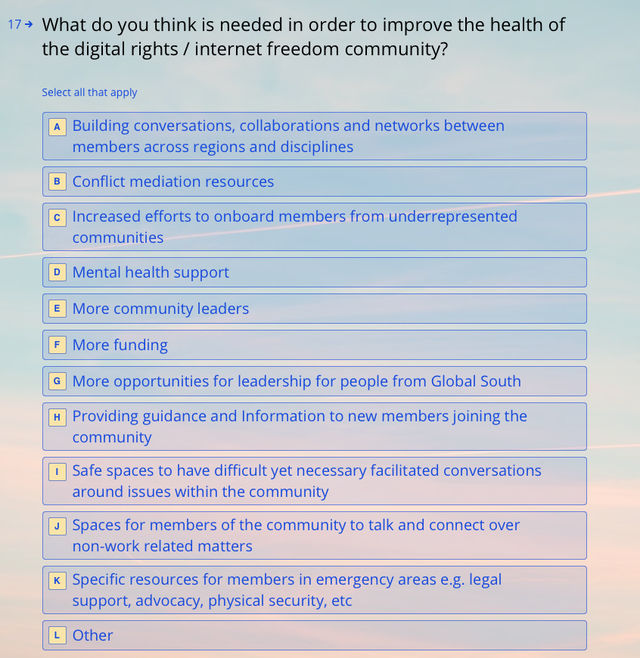
1. DigitalRights.Community is conducting a survey to improve the psychosocial wellbeing of the community. Please take part by answering the questions, and share with your own community: www.digitalrights.community/blog/take-the-survey
2. CCC had a “Resilience and Sustainability” track at 36c3 in December 2019, and the recordings of those talks are still relevant: media.ccc.de
3. Hackerspace TechInc in Amsterdam is offering a social playground to its members, since the physical meetings are discouraged due to pandemic measures : https://play.social.techinc.nl/
Join us every Wednesday evening for an “social hour”!
You are welcome to use it for your own (small) groups and events, and there is documentation available for installing, hosting and maintaining another FLOSS instance.

Sharing is Caring
By sharing experiences and tools we can help each other increase wellbeing and persist as communities that are more resilient to new crises.
Please use the comments section below to share your tips or questions!
-- --
(*) corona pandemic pain points: lockdowns, working-from-home (if you are privileged to have a job that allows it); juggling essential work and self-care, social-distancing, “remote work”, virtual events, home-schooling, “shelter in place”, travel restrictions, protests, self-isolation, death or sickness, economic hardships and global crisis-es, vaccinations (or not), testing, track-and-trace, "long COVID", coping and falling apart…


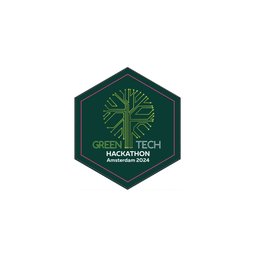
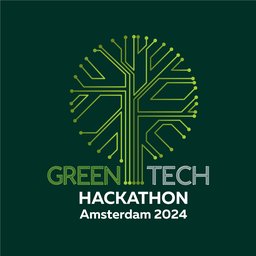
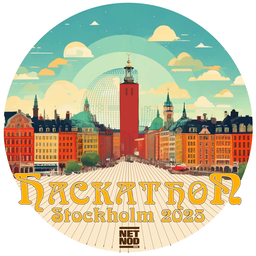
Comments 5
The comments section is closed for articles published more than a year ago. If you'd like to inform us of any issues, please contact us.
Vesna Manojlovic •
On Tuesday, 16. March 2021, there is an upcoming event "Resilience Skills You Need Right Now", by resilience expert, Deborah Gilboa, MD, aka “Dr. G” works with families, organizations, and businesses to identify the mindset and strategies to turn stress to an advantage: https://www.meetup.com/meetup-live/events/276814472/ "Can you believe it’s been a year since we went into lockdown? The past 12 months have been filled with uncertainty, but one thing is for sure: stress levels are soaring. Let’s take the time to learn how to channel our stress, negative energy, and longing of the past into something more useful. Learn resilience skills for anything life throws your way."
Vesna Manojlovic •
More events! On Tuesday 23. March there is EMEA InfoSecurity Magazine Summit, and on Wednesday 24. March the North America version: https://www.infosecurity-magazine.com/online-summits/spring-2021-emea-edition/ & https://www.infosecurity-magazine.com/online-summits/mar-24-2021-north-america/ For met he most interesting talks are: "Diversity & Inclusion - Ensuring a Cyber Future that Works for All" & "Take A Deeper Look at Team Burnout & How the Industry Can Tackle Mental Health" . Take a look at the rest of the programme and register for free!
Mike Wang •
Very well written, and shared a lot of new concepts, so good to read this article.
Wolfgang Tremmel •
On the 16th of March 2020 I started working from home. 9 month later I wrote about my experiences, 12 month later I updated and finally published it: https://outpost.garf.de/wordpress/index.php/2021/03/12/working-from-home-12-months-in/
Michael Oghia •
This is really brilliant Vesna, and so heartwarming to see / read. Well done! And thank you for being here.